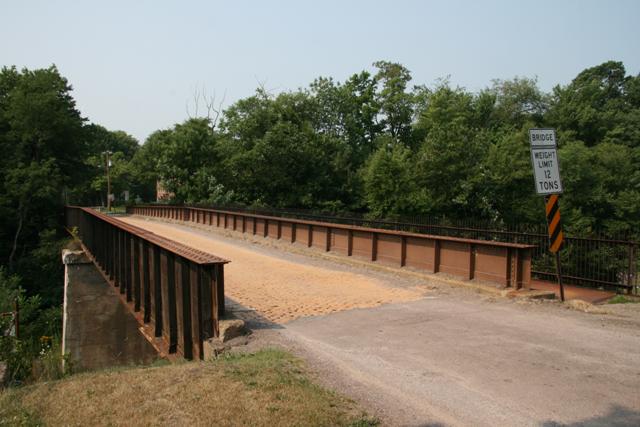We Recommend:
Bach Steel - Experts at historic truss bridge restoration.
BridgeHunter.com Phase 1 is released to the public! - Visit Now
Church Street Bridge

Primary Photographer(s): Nathan Holth and Rick McOmber
Bridge Documented: August 2, 2007
Garrett: Somerset County, Pennsylvania: United States
1955
78.0 Feet (23.8 Meters)
166.0 Feet (50.6 Meters)
15.7 Feet (4.79 Meters)
2 Main Span(s)
552037005025260

View Information About HSR Ratings
Bridge Documentation
This bridge no longer exists!
View Archived National Bridge Inventory Report - Has Additional Details and Evaluation
This bridge has been demolished and replaced!
Anyone who lives in Michigan can tell someone who lives in Pennsylvania why preserving highway through plate girders is important... because not everyone has a lot of them. Pennsylvania and New York built a lot of through plate girders, while some other states like Michigan hardly built any on their roads.
This 1919 example in Pennsylvania should be considered significant because it is a relatively older example, includes an uncommon (and attractive) brick deck, and is a multi-span structure. The bridge is also a good candidate for preservation because it retains excellent historic integrity, including the unusual railings which appear to be original.
A 2008 inspection report released by PennDOT shows the extremely poor structural condition of the bridge. The inspection report might as well be a document listing how tax dollars have been wasted. With a car, you are spending your money better by getting an oil change frequently, rather than never changing the oil and seeing how long the car goes until it breaks down. Bridges are no different.
Information and Findings From Pennsylvania's Historic Bridge InventoryDiscussion of Bridge The 1919, 2 simple span, 164' long and 17' wide built up thru girder bridge is supported on concrete abutments and a concrete pier. The bridge has knee braces, built up floorbeams encased in concrete to protect them from locomotive exhausts, and concrete deck with a brick wearing surface. There are cantilevered sidewalks with metal fence-like railings at each side. Girder bridges were first developed by the railroad industry in the 1850s, and they were used on vehicular roadways in Pennsylvania beginning in the late 19th century. The bridge is not the first at this grade crossing of the B & O RR main line through Pennsylvania, and it is not historically significant in association with the line. It is also not located in a potential historic district in Garrett. The area has some individually potentially significant buildings, but most of the houses and other buildings are highly altered. Discussion of Surrounding Area The bridge carries 1 lane of traffic and 1 sidewalk over 2 active CSXT railroad tracks in Garrett borough. The line is the former B&O RR main line in Pennsylvania, built in the 1870s to connect Baltimore with Pittsburgh. PHMC may have determined the line eligible in 1997, but no boundaries, period of significance, or contributing resources were apparently determined. The setting has some individually significant buildings, like the 1908 school beyond the the SW quadrant and Queen Anne style house beyond the NW quadrant, but there are too many intrusions and altered buildings for the area to meet the integrity threshold for a potential historic district. The buildings at the bridge quadrants are the more complete with those beyond having significant alterations. Bridge Considered Historic By Survey: No |
![]()
Photo Galleries and Videos: Church Street Bridge
Bridge Photo-Documentation
A collection of overview and detail photos. This photo gallery contains a combination of Original Size photos and Mobile Optimized photos in a touch-friendly popup viewer.Alternatively, Browse Without Using Viewer
![]()
Maps and Links: Church Street Bridge
This historic bridge has been demolished. This map is shown for reference purposes only.
Coordinates (Latitude, Longitude):
Search For Additional Bridge Listings:
Bridgehunter.com: View listed bridges within 0.5 miles (0.8 kilometers) of this bridge.
Bridgehunter.com: View listed bridges within 10 miles (16 kilometers) of this bridge.
Additional Maps:
Google Streetview (If Available)
GeoHack (Additional Links and Coordinates)
Apple Maps (Via DuckDuckGo Search)
Apple Maps (Apple devices only)
Android: Open Location In Your Map or GPS App
Flickr Gallery (Find Nearby Photos)
Wikimedia Commons (Find Nearby Photos)
Directions Via Sygic For Android
Directions Via Sygic For iOS and Android Dolphin Browser
USGS National Map (United States Only)
Historical USGS Topo Maps (United States Only)
Historic Aerials (United States Only)
CalTopo Maps (United States Only)

